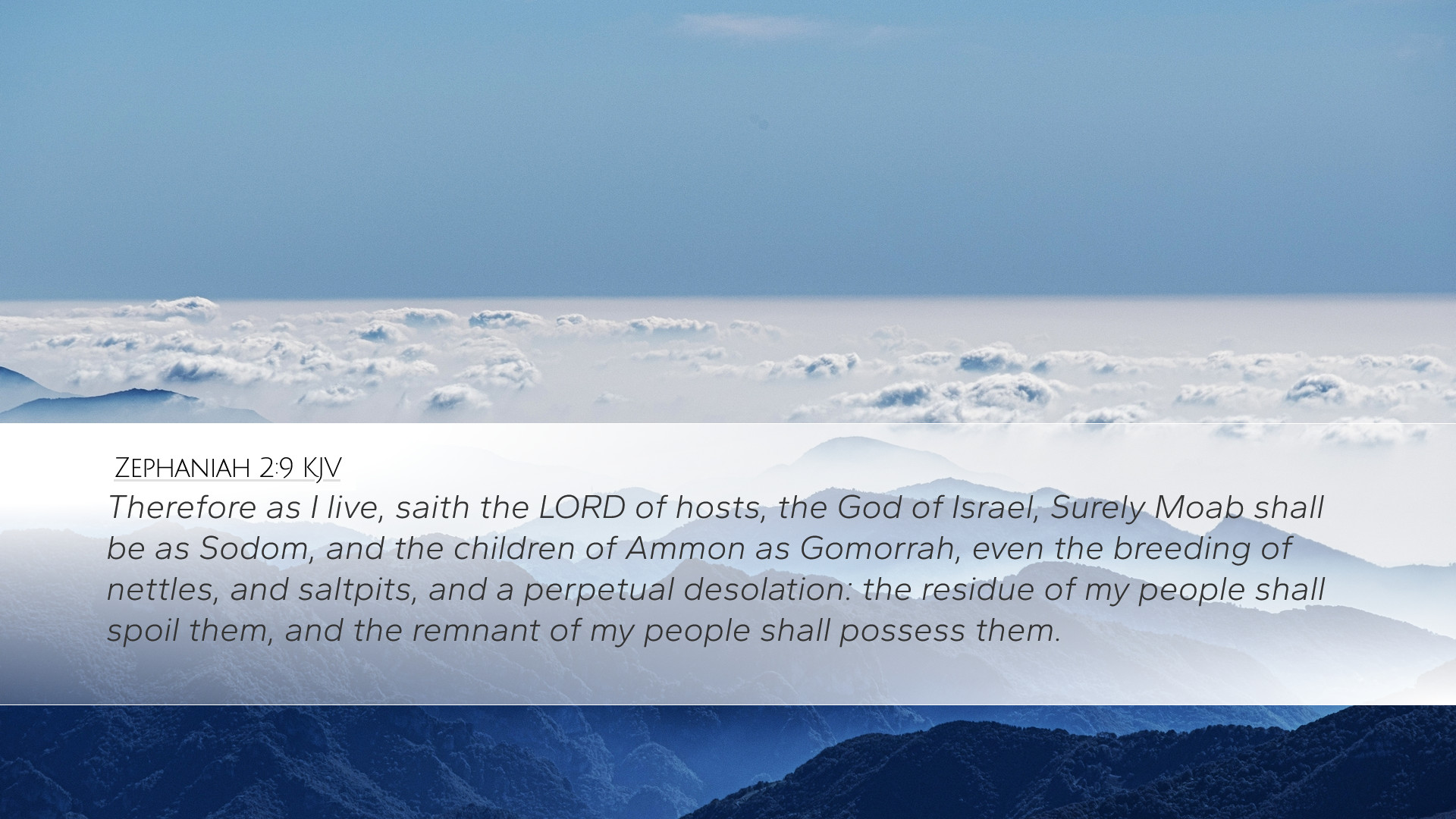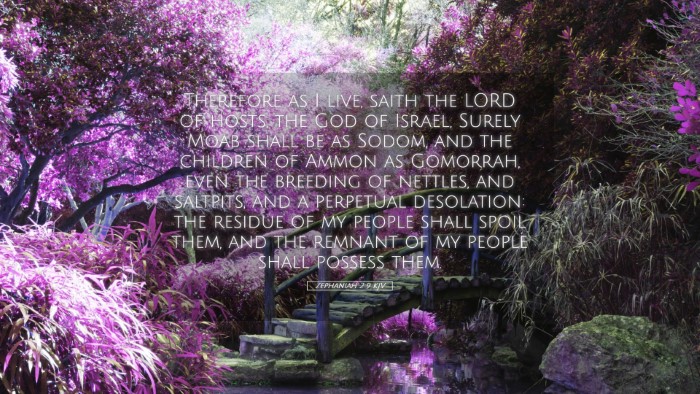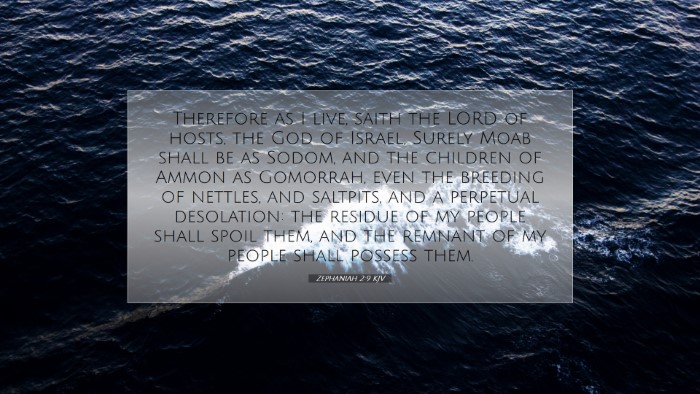Old Testament
Genesis Exodus Leviticus Numbers Deuteronomy Joshua Judges Ruth 1 Samuel 2 Samuel 1 Kings 2 Kings 1 Chronicles 2 Chronicles Ezra Nehemiah Esther Job Psalms Proverbs Ecclesiastes Song of Solomon Isaiah Jeremiah Lamentations Ezekiel Daniel Hosea Joel Amos Obadiah Jonah Micah Nahum Habakkuk Zephaniah Haggai Zechariah MalachiZephaniah 2:9
Zephaniah 2:9 KJV
Therefore as I live, saith the LORD of hosts, the God of Israel, Surely Moab shall be as Sodom, and the children of Ammon as Gomorrah, even the breeding of nettles, and saltpits, and a perpetual desolation: the residue of my people shall spoil them, and the remnant of my people shall possess them.
Zephaniah 2:9 Bible Commentary
Commentary on Zephaniah 2:9
Verse: "Therefore as I live, saith the Lord of hosts, the God of Israel, Surely Moab shall be as Sodom, and the children of Ammon as Gomorrah, even the breeding of nettles, and saltpits, and a perpetual desolation: the residue of my people shall spoil them, and the remnant of my people shall possess them."
Introduction
Zephaniah, one of the minor prophets, delivers a message that is both dire and hopeful—a pattern observed throughout Scripture. The prophet's oracle concerning Moab and Ammon reflects both judgment and the sovereignty of God over the nations. This commentary synthesizes insights from notable public domain commentaries to unfold the theological and pastoral significance of Zephaniah 2:9.
Contextual Overview
Zephaniah prophesies during the reign of King Josiah, a时期 of religious reform in Judah amid the looming threat of Babylonian hegemony. His prophecies center on the Day of the Lord, a theme that underscores divine judgment against sin and idolatry while emphasizing the hope of restoration for God's remnant.
Background on Moab and Ammon
Both Moab and Ammon were nations that descended from Lot, Abraham's nephew, and were often in conflict with Israel. Their historical antagonism is crucial for understanding God's pronouncement of judgment upon them. The imagery of Sodom and Gomorrah—symbolic of total destruction—serves to emphasize the certainty of their downfall.
Theological Significance
Divine Judgment
Matthew Henry elaborates on the Lord's declaration, suggesting that the catastrophic fate of Moab and Ammon serves as a solemn warning against the consequences of sin. Their ultimate demise is a manifestation of God's unwavering justice. Moab's and Ammon's lives of luxury and idolatry would be replaced by desolation, suggesting that even the strongest nations are subject to divine judgment.
God's Sovereignty
Albert Barnes notes that God's declaration "as I live" underscores the certainty of His word and the permanence of His promises. This phrase affirms God’s sovereignty, ruling over both Israel and surrounding nations. The prophetic utterance about Moab and Ammon can be seen as a declaration of God's ultimate authority in the affairs of men, reminding readers of the futility of resistance against divine will.
Hope for the Remnant
Despite the grim proclamation regarding Moab and Ammon, there is a noteworthy transition towards hope. Adam Clarke points out that the verse concludes with mention of God's people spoiling the nations. The remnant of Israel will inherit what was once held by their enemies. This indicates that God’s plan includes restoration and victory for His faithful, illustrating a common biblical theme of hope amidst judgment.
Implications for Understanding
Judgment and Grace
The juxtaposition of judgment and grace is central to Zephaniah's message. The destruction faced by Moab and Ammon starkly contrasts with the preservation of God's remnant, leading to a multifaceted understanding of God’s character. He is both just and merciful, executing judgment while providing a pathway for salvation.
Lessons for Contemporary Application
For pastors and theologians today, Zephaniah 2:9 serves as a reminder of the serious nature of divine judgment against sin, urging congregations to pursue holiness and righteousness. The verse encourages believers to be vigilant against the allure of idolatry and the distractions of contemporary life that depart from God’s ways.
Conclusion
Zephaniah 2:9 encapsulates a profound truth about God's dealings with nations and individuals. The prophetic assurance that Moab and Ammon would face destruction stands as a testament to God's sovereignty and justice, while the hope for Israel's remnant assures us of God’s unwavering commitment to his people. In this end, Zephaniah not only warns of impending judgment but also whispers promises of redemption and restoration, encouraging readers to trust in the Lord's ultimate plan.
Key Takeaways
- Divine judgment is certain for those who oppose God's will.
- God's sovereignty extends over all nations and peoples.
- Amidst judgment, there is hope for restoration for God's faithful remnant.
- Believers today are called to respond with faithfulness and purity.


